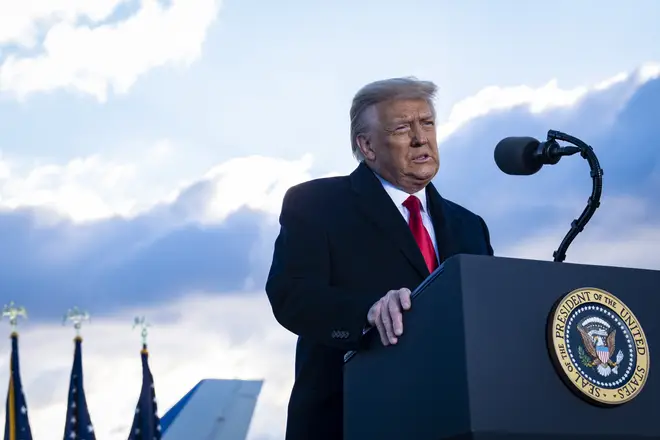
Ali Miraj 6pm - 9pm
13 February 2021, 19:17

The US senate has reached a deal to skip witness testimony in the impeachment trial of former president Donald Trump.
The agreement averts a prolonged trial and sets up closing arguments from both sides on Saturday.
After being thrown into confusion, the senators had voted earlier in the day to adjourn while they tried to work out an agreement.
The rare Saturday session was intended for closing arguments in Mr Trump's trial over whether he is guilty of inciting the deadly riot at the US Capitol on January 6.
Acquittal still appears likely, following the news that this is the way Republican leader Mitch McConnell plans to vote.
Senators agreed to accept new information from a Republican congresswoman about Mr Trump's actions on the day of the deadly Capitol siege.
Under the deal, representative Jaime Herrera Beutler's statement on a phone call between Mr Trump and House Republican leader Kevin McCarthy as rioters stormed the Capitol was entered into the trial record as evidence. No further witnesses were called.

Global politics expert believes Trump will be acquitted
Republicans are anxious to get the trial over with and put any discussion of Mr Trump and the Capitol invasion behind them. Five people were killed in the unrest last month.
Democrats, too, have a motive to move on since the US senate cannot move ahead on President Joe Biden's agenda - including Covid-19 relief - while the impeachment trial is in session.
While most Democrats are expected to vote to convict the former president, acquittal appears likely with a two-thirds majority required for conviction and the chamber split 50-50 between the parties.
Republican leader Mitch McConnell said he would vote to acquit Mr Trump, according to an inside source. Mr McConnell's view is likely to influence that of his party colleagues.
At issue on Saturday was whether to subpoena representative Jaime Herrera Beutler of Washington state, one of 10 Republicans to vote for Mr Trump's impeachment in the House.
She said in a statement on Friday that Mr Trump rebuffed a plea from Mr McCarthy to call off the rioters.
Democrats consider this to be key corroborating evidence that confirms the president's "wilful dereliction of duty and desertion of duty as commander in chief".

Donald Trump tells supporters 'we will be back' in final speech
The situation was resolved when Ms Herrera Beutler's statement on the call was read aloud into the record for senators to consider as evidence.
As part of the deal, Democrats dropped their planned deposition and Republicans abandoned their threat to subpoena hundreds of their witnesses.
The case then proceeded to closing arguments.
Mr Trump's lawyers had opposed calling witnesses, with attorney Michael van der Veen saying it would open the door to him calling as many as 100.
He said the depositions could be done in his law office in Philadelphia, prompting laughter from senators.
"If you vote for witnesses," Mr Van der Veen said, crossing his arms and then then raising them in the air for emphasis, "do not handcuff me by limiting the number of witnesses that I can have."
Senators meeting as the court of impeachment are restrained in taking up other business without the consent of the Republican minority, which is unlikely.
Rules require senators to be present for the proceedings and this past week almost no other major items have been considered as the trial was under way.
The outcome of the raw and emotional proceedings is expected to reflect a country divided over the former president and the future of his brand of politics.
The verdict could influence not only Mr Trump's political future, but that of the senators sworn to deliver impartial justice as jurors.
Mr Trump is the only president to be impeached twice, and the first to face trial charges after leaving office.
Unlike last year's impeachment trial over the Ukraine affair - a complicated charge of corruption and obstruction over his attempts to have the foreign ally dig up dirt on then-campaign rival Mr Biden - this one brought an emotional punch over the unexpected vulnerability of the US tradition of peaceful elections. The charge is singular: incitement of insurrection.
The week-long trial has delivered a grim and graphic narrative of the riot and its consequences in ways that senators, most of whom fled for their own safety that day, acknowledge they are still coming to grips with.
House prosecutors have argued that Mr Trump's rallying cry to go to the Capitol and "fight like hell", for his presidency just as Congress was convening January 6 to certify Mr Biden's election victory, was part of an orchestrated pattern of violent rhetoric and false claims that unleashed the mob.
Five people died, including a rioter who was shot and a police officer.
Mr Trump's lawyers countered that Mr Trump's words were not intended to incite the violence and that impeachment is nothing but a "witch hunt" designed to prevent him from serving in office again.